Attached files
| file | filename |
|---|---|
| 8-K - 8-K - UNIVERSAL TECHNICAL INSTITUTE INC | feb2018investorpresentatio.htm |
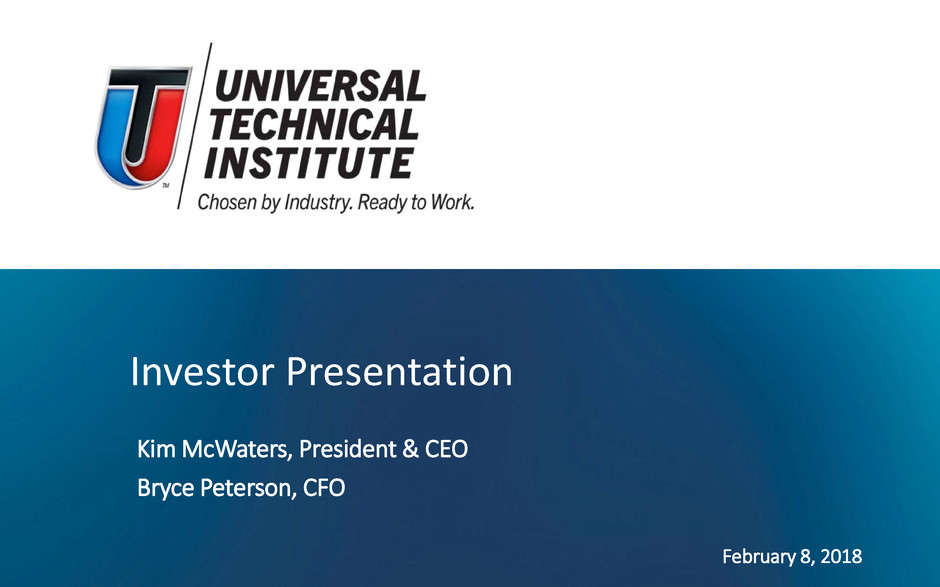
Investor Presentation
Kim McWaters, President & CEO
Bryce Peterson, CFO
February 8, 2018
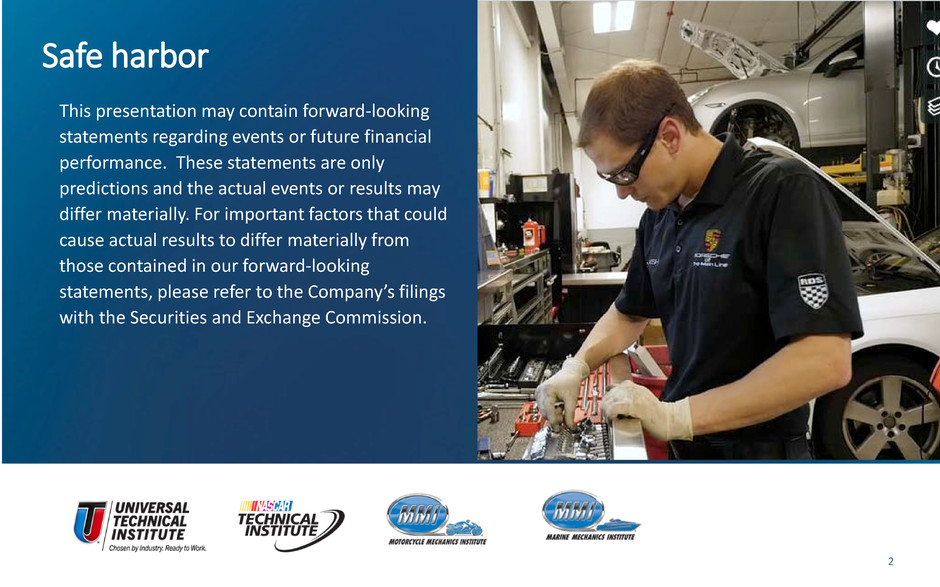
2
This presentation may contain forward-looking
statements regarding events or future financial
performance. These statements are only
predictions and the actual events or results may
differ materially. For important factors that could
cause actual results to differ materially from
those contained in our forward-looking
statements, please refer to the Company’s filings
with the Securities and Exchange Commission.
Safe harbor
2
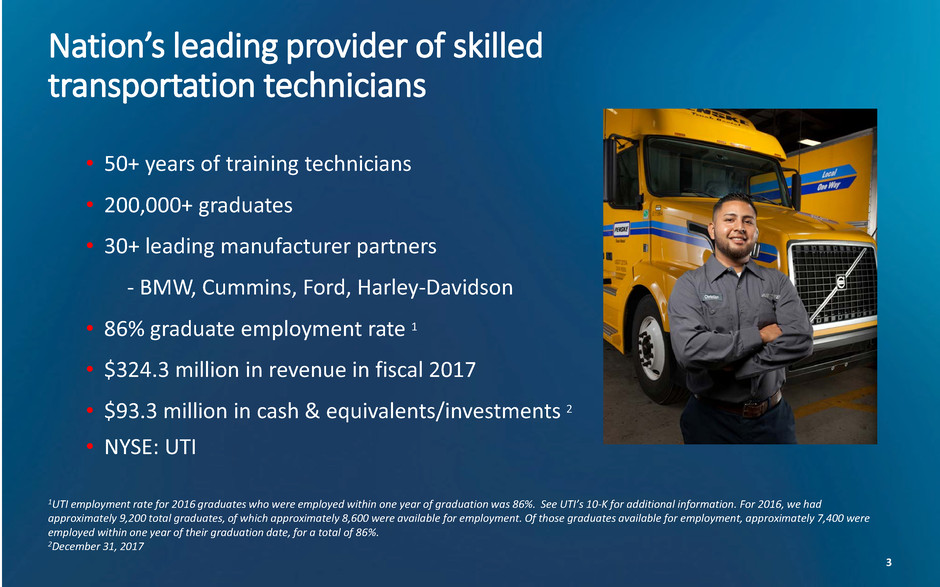
3
• 50+ years of training technicians
• 200,000+ graduates
• 30+ leading manufacturer partners
- BMW, Cummins, Ford, Harley-Davidson
• 86% graduate employment rate 1
• $324.3 million in revenue in fiscal 2017
• $93.3 million in cash & equivalents/investments 2
• NYSE: UTI
Nation’s leading provider of skilled
transportation technicians
1UTI employment rate for 2016 graduates who were employed within one year of graduation was 86%. See UTI’s 10-K for additional information. For 2016, we had
approximately 9,200 total graduates, of which approximately 8,600 were available for employment. Of those graduates available for employment, approximately 7,400 were
employed within one year of their graduation date, for a total of 86%.
2December 31, 2017
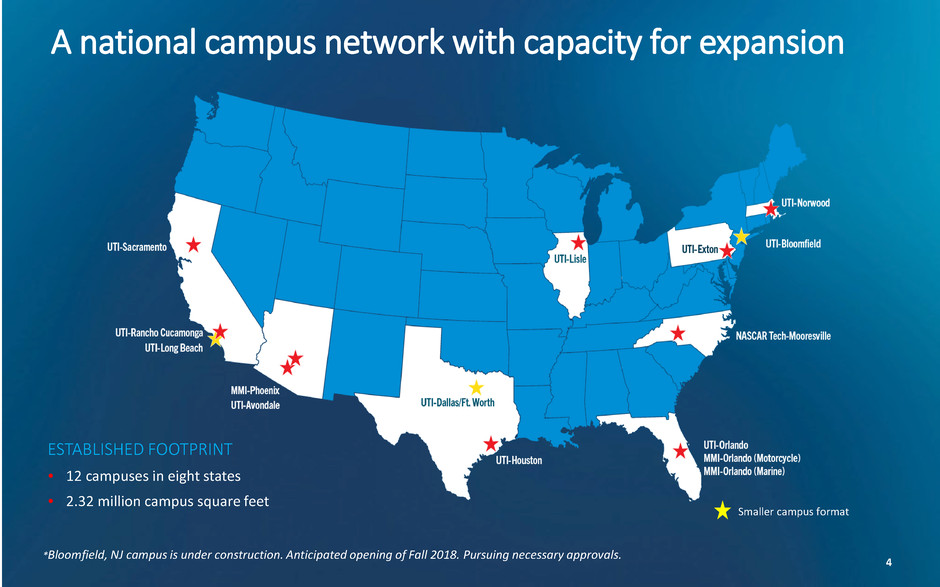
4
A national campus network with capacity for expansion
Smaller campus format
ESTABLISHED FOOTPRINT
• 12 campuses in eight states
• 2.32 million campus square feet
*Bloomfield, NJ campus is under construction. Anticipated opening of Fall 2018. Pursuing necessary approvals.
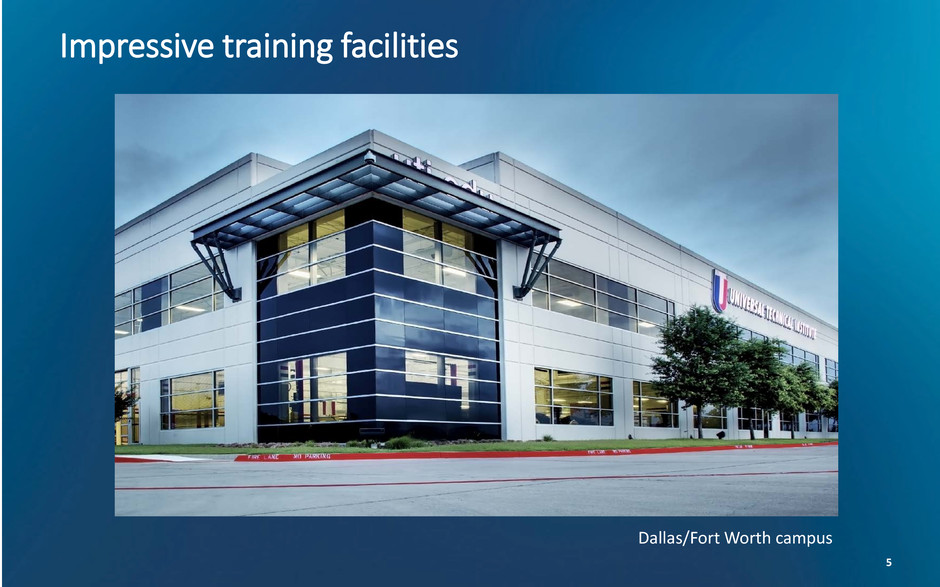
5
Impressive training facilities
Dallas/Fort Worth campus
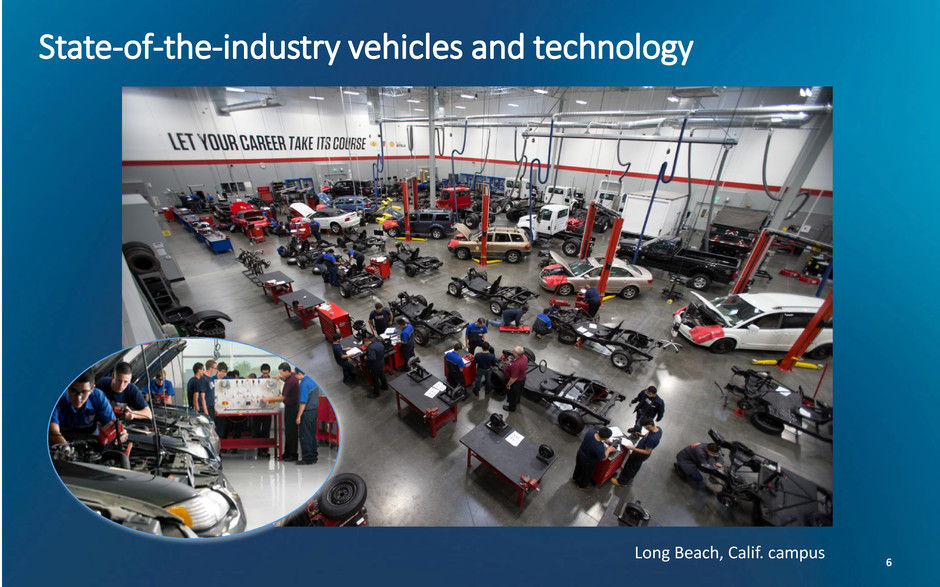
6
State-of-the-industry vehicles and technology
Long Beach, Calif. campus
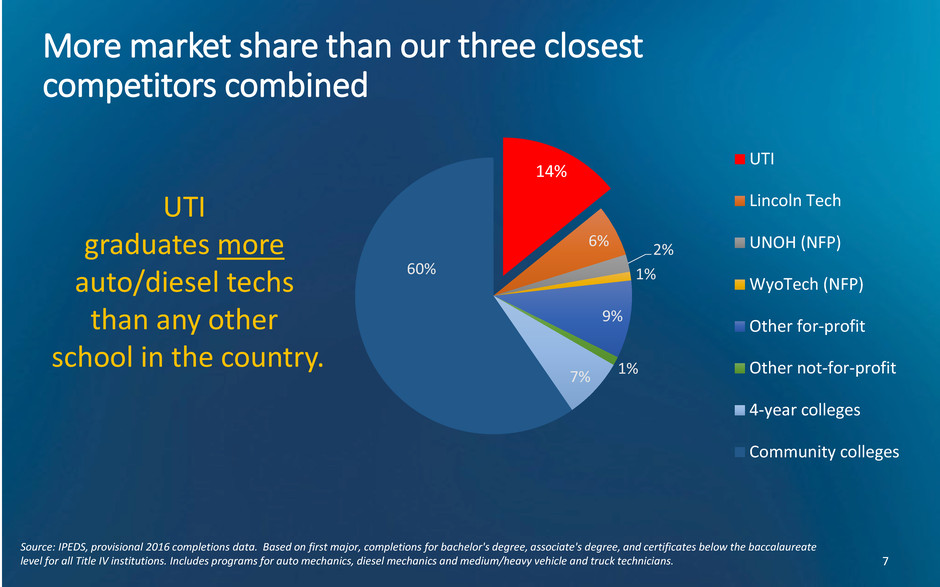
14%
6% 2%
1%
9%
1% 7%
60%
UTI
Lincoln Tech
UNOH (NFP)
WyoTech (NFP)
Other for-profit
Other not-for-profit
4-year colleges
Community colleges
7
Source: IPEDS, provisional 2016 completions data. Based on first major, completions for bachelor's degree, associate's degree, and certificates below the baccalaureate
level for all Title IV institutions. Includes programs for auto mechanics, diesel mechanics and medium/heavy vehicle and truck technicians.
More market share than our three closest
competitors combined
UTI
graduates more
auto/diesel techs
than any other
school in the country.
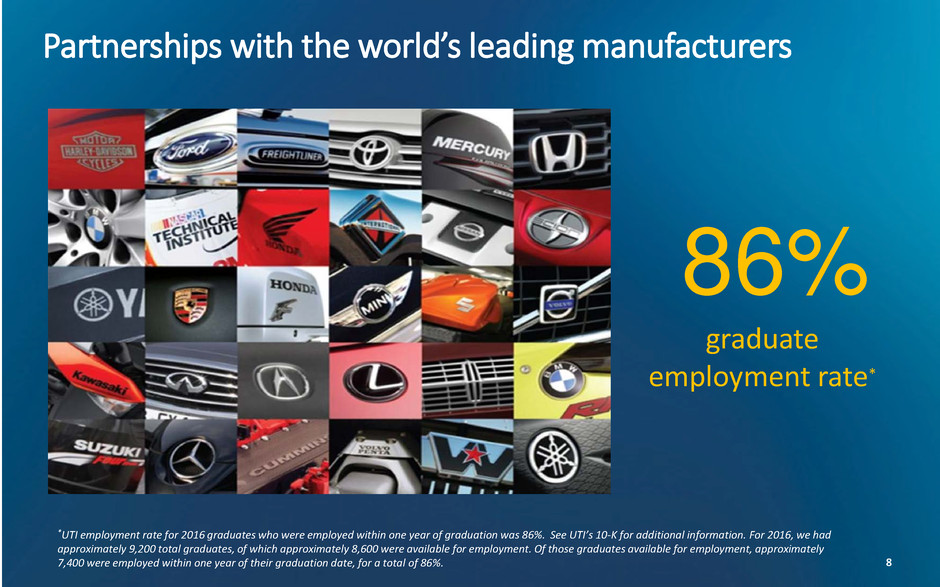
8
Partnerships with the world’s leading manufacturers
86%
graduate
employment rate*
*UTI employment rate for 2016 graduates who were employed within one year of graduation was 86%. See UTI’s 10-K for additional information. For 2016, we had
approximately 9,200 total graduates, of which approximately 8,600 were available for employment. Of those graduates available for employment, approximately
7,400 were employed within one year of their graduation date, for a total of 86%.
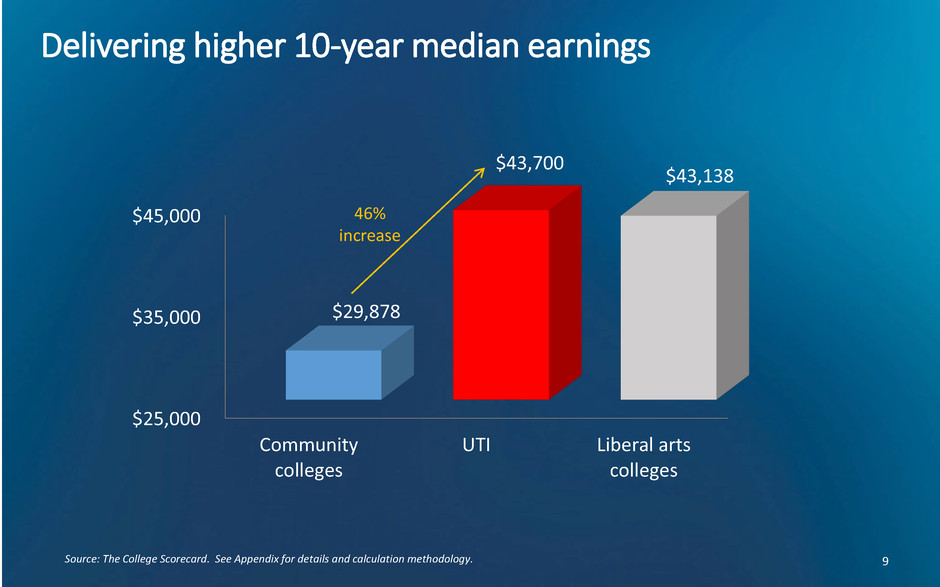
$25,000
$35,000
$45,000
Community
colleges
UTI Liberal arts
colleges
$29,878
$43,700
$43,138
Delivering higher 10-year median earnings
Source: The College Scorecard. See Appendix for details and calculation methodology.
46%
increase
9
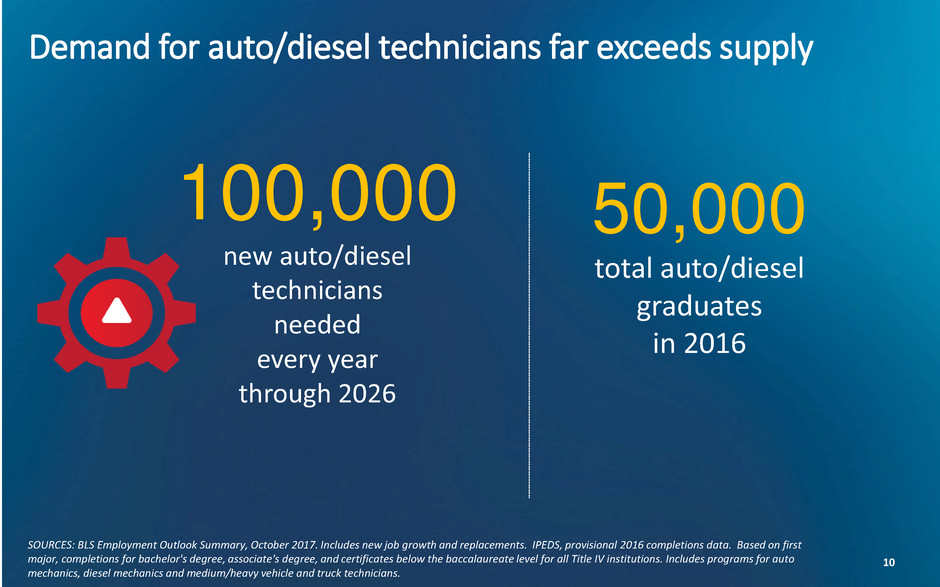
10
Demand for auto/diesel technicians far exceeds supply
100,000
new auto/diesel
technicians
needed
every year
through 2026
SOURCES: BLS Employment Outlook Summary, October 2017. Includes new job growth and replacements. IPEDS, provisional 2016 completions data. Based on first
major, completions for bachelor's degree, associate's degree, and certificates below the baccalaureate level for all Title IV institutions. Includes programs for auto
mechanics, diesel mechanics and medium/heavy vehicle and truck technicians.
50,000
total auto/diesel
graduates
in 2016
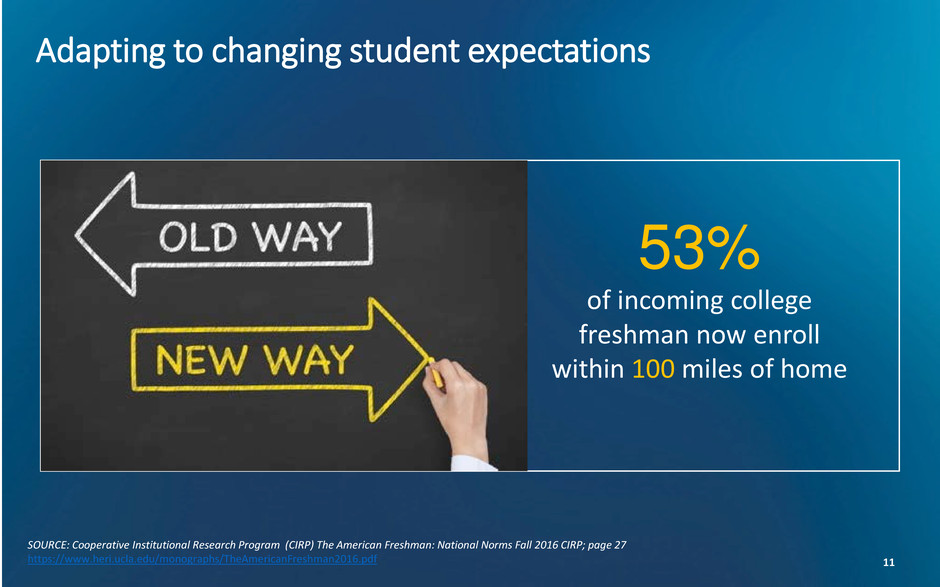
11
Adapting to changing student expectations
53%
of incoming college
freshman now enroll
within 100 miles of home
SOURCE: Cooperative Institutional Research Program (CIRP) The American Freshman: National Norms Fall 2016 CIRP; page 27
https://www.heri.ucla.edu/monographs/TheAmericanFreshman2016.pdf
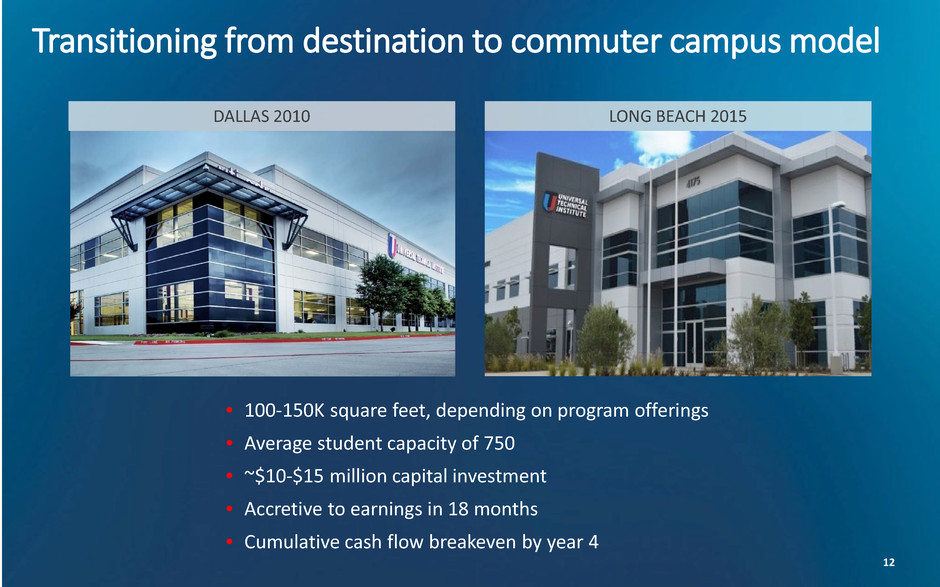
12
Transitioning from destination to commuter campus model
DALLAS 2010
• 100-150K square feet, depending on program offerings
• Average student capacity of 750
• ~$10-$15 million capital investment
• Accretive to earnings in 18 months
• Cumulative cash flow breakeven by year 4
LONG BEACH 2015
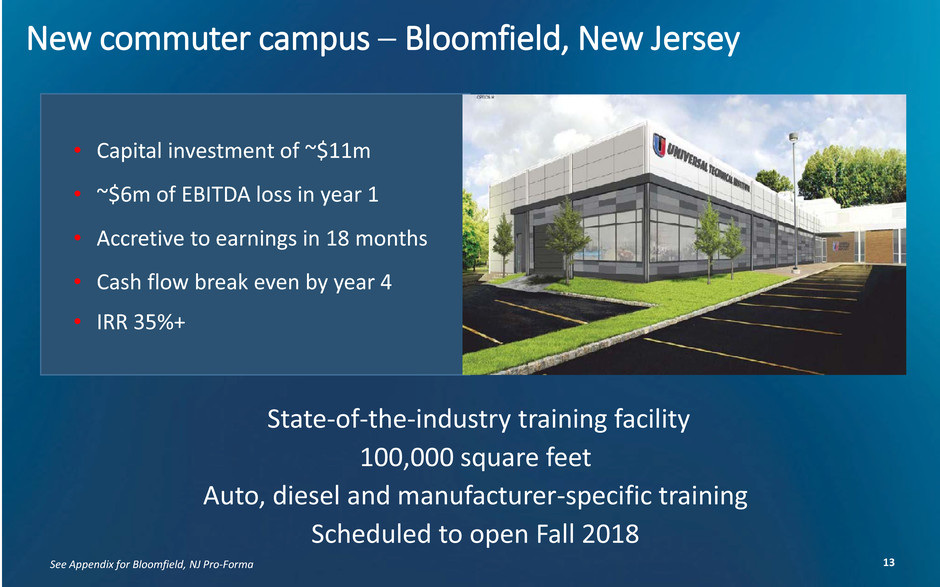
13
New commuter campus – Bloomfield, New Jersey
• Capital investment of ~$11m
• ~$6m of EBITDA loss in year 1
• Accretive to earnings in 18 months
• Cash flow break even by year 4
• IRR 35%+
See Appendix for Bloomfield, NJ Pro-Forma
State-of-the-industry training facility
100,000 square feet
Auto, diesel and manufacturer-specific training
Scheduled to open Fall 2018
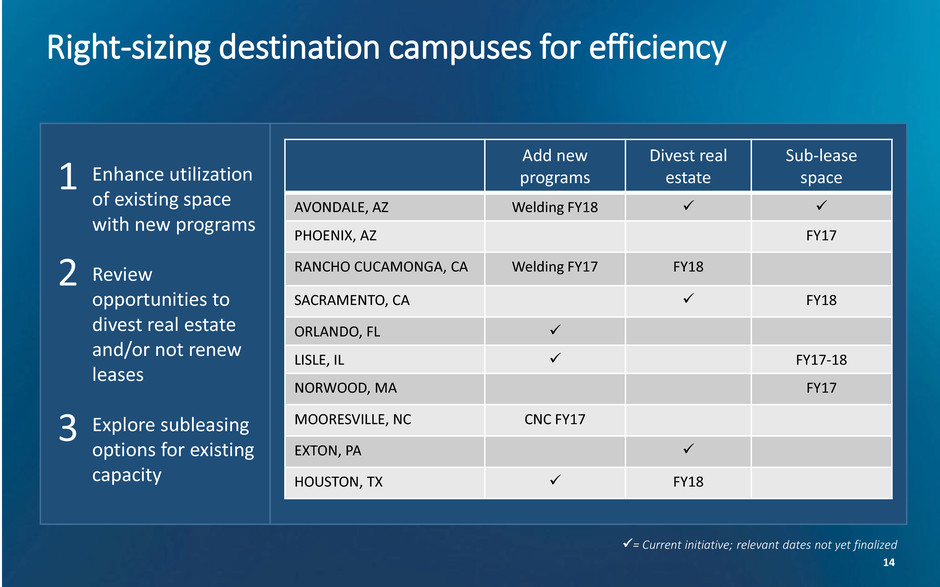
14
Enhance utilization
of existing space
with new programs
Review
opportunities to
divest real estate
and/or not renew
leases
Explore subleasing
options for existing
capacity
Right-sizing destination campuses for efficiency
= Current initiative; relevant dates not yet finalized
AVONDALE, AZ Welding FY18
PHOENIX, AZ FY17
RANCHO CUCAMONGA, CA Welding FY17 FY18
SACRAMENTO, CA FY18
ORLANDO, FL
LISLE, IL FY17-18
NORWOOD, MA FY17
MOORESVILLE, NC CNC FY17
EXTON, PA
HOUSTON, TX FY18
Add new
programs
Divest real
estate
Sub-lease
space 1
3
2
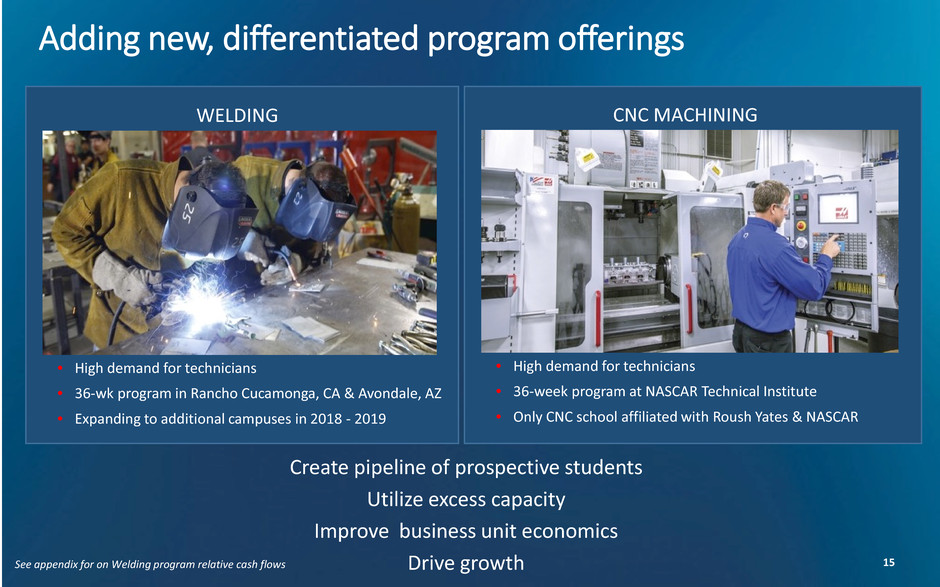
15
Adding new, differentiated program offerings
CNC MACHINING
• High demand for technicians
• 36-week program at NASCAR Technical Institute
• Only CNC school affiliated with Roush Yates & NASCAR
WELDING
• High demand for technicians
• 36-wk program in Rancho Cucamonga, CA & Avondale, AZ
• Expanding to additional campuses in 2018 - 2019
Create pipeline of prospective students
Utilize excess capacity
Improve business unit economics
Drive growth
See appendix for on Welding program relative cash flows
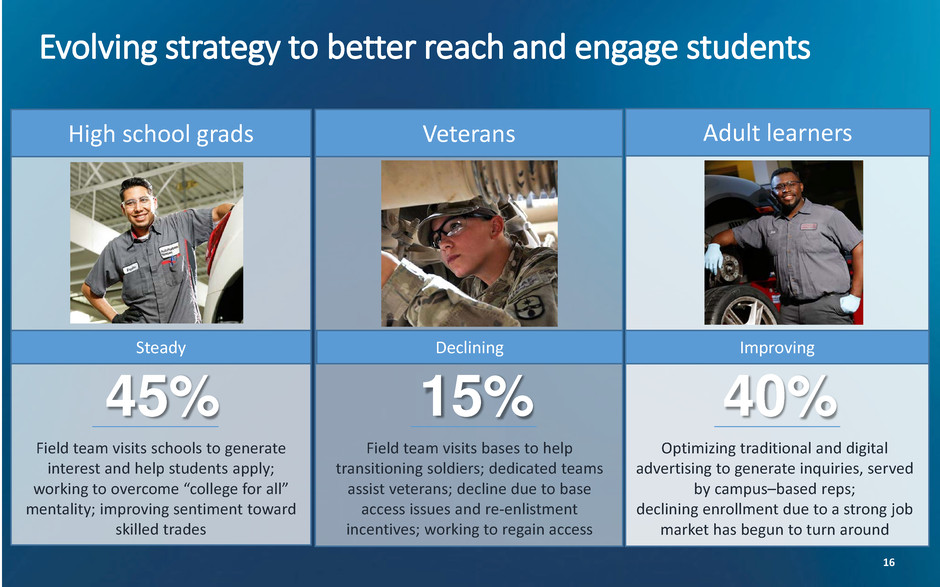
16
Evolving strategy to better reach and engage students
HIGH SCHOOL GRADS ADULT LEARNERS
Steady Declining Improving
45% 15% 40%
igh school grads Veterans dult learners
Field team visits schools to generate
interest and help students apply;
working to overcome “college for all”
mentality; improving sentiment toward
skilled trades
Field team visits bases to help
transitioning soldiers; dedicated teams
assist veterans; decline due to base
access issues and re-enlistment
incentives; working to regain access
Optimizing traditional and digital
advertising to generate inquiries, served
by campus–based reps;
declining enrollment due to a strong job
market has begun to turn around
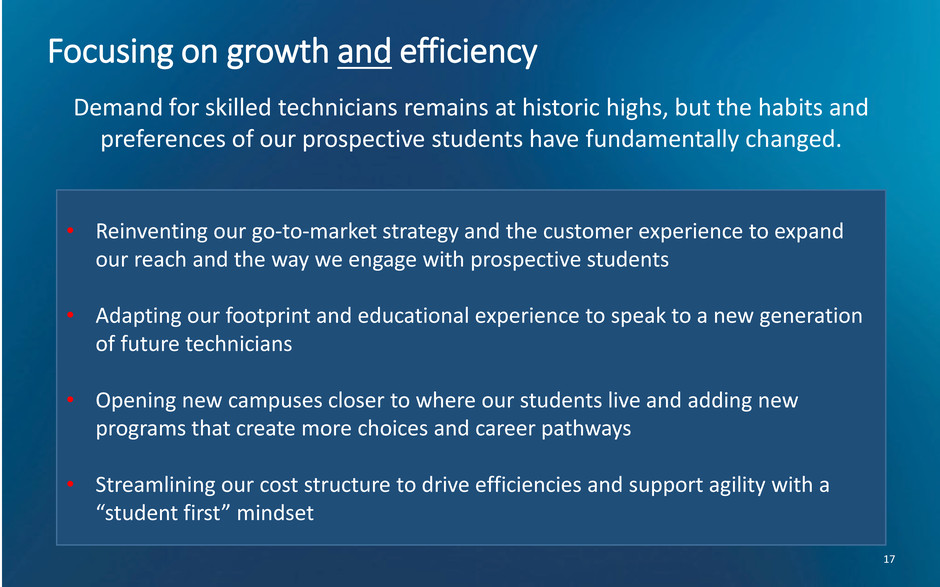
Focusing on growth and efficiency
17
Demand for skilled technicians remains at historic highs, but the habits and
preferences of our prospective students have fundamentally changed.
• Reinventing our go-to-market strategy and the customer experience to expand
our reach and the way we engage with prospective students
• Adapting our footprint and educational experience to speak to a new generation
of future technicians
• Opening new campuses closer to where our students live and adding new
programs that create more choices and career pathways
• Streamlining our cost structure to drive efficiencies and support agility with a
“student first” mindset
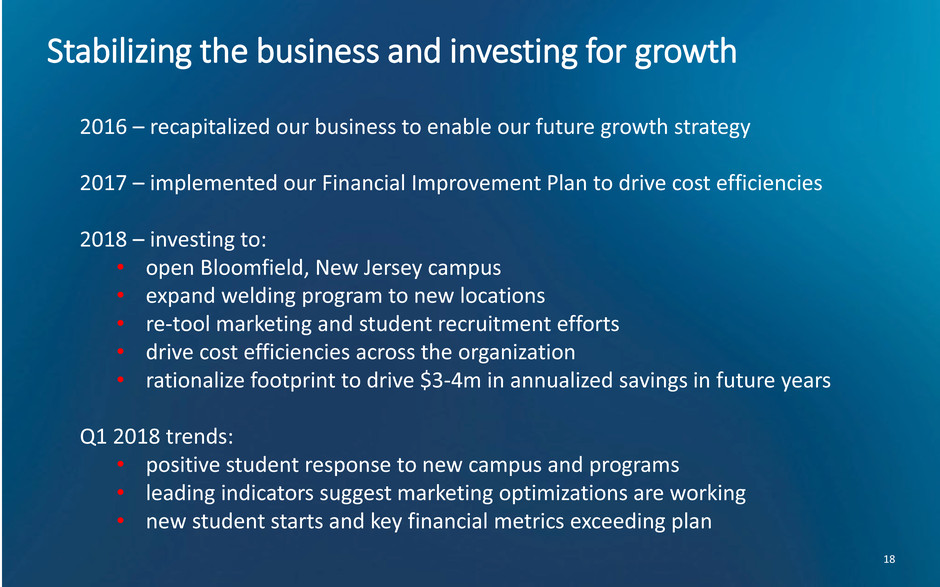
2016 – recapitalized our business to enable our future growth strategy
2017 – implemented our Financial Improvement Plan to drive cost efficiencies
2018 – investing to:
• open Bloomfield, New Jersey campus
• expand welding program to new locations
• re-tool marketing and student recruitment efforts
• drive cost efficiencies across the organization
• rationalize footprint to drive $3-4m in annualized savings in future years
Q1 2018 trends:
• positive student response to new campus and programs
• leading indicators suggest marketing optimizations are working
• new student starts and key financial metrics exceeding plan
Stabilizing the business and investing for growth
18
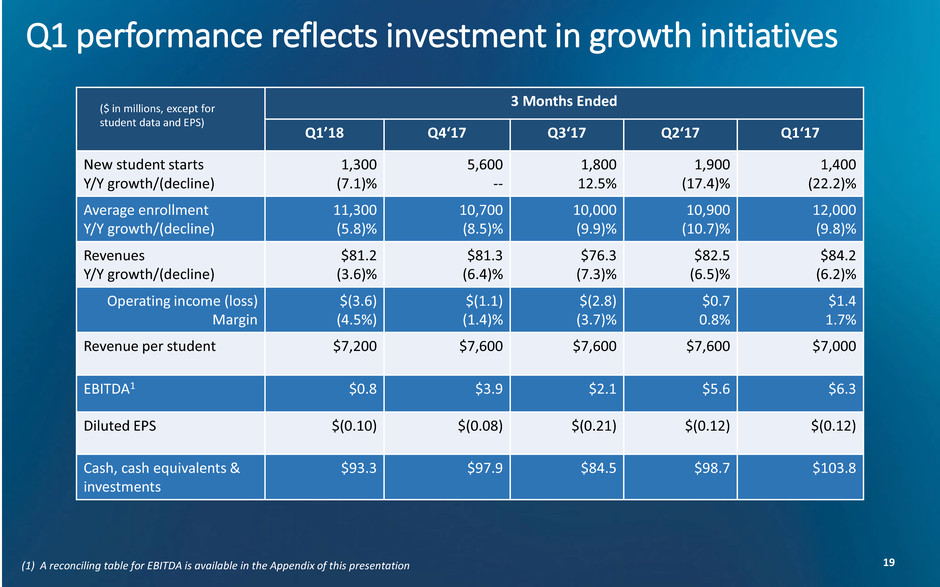
19
Q1 performance reflects investment in growth initiatives
(1) A reconciling table for EBITDA is available in the Appendix of this presentation
3 Months Ended
Q1’18 Q4‘17 Q3‘17 Q2‘17 Q1‘17
New student starts
Y/Y growth/(decline)
1,300
(7.1)%
5,600
--
1,800
12.5%
1,900
(17.4)%
1,400
(22.2)%
Average enrollment
Y/Y growth/(decline)
11,300
(5.8)%
10,700
(8.5)%
10,000
(9.9)%
10,900
(10.7)%
12,000
(9.8)%
Revenues
Y/Y growth/(decline)
$81.2
(3.6)%
$81.3
(6.4)%
$76.3
(7.3)%
$82.5
(6.5)%
$84.2
(6.2)%
Operating income (loss)
Margin
$(3.6)
(4.5%)
$(1.1)
(1.4)%
$(2.8)
(3.7)%
$0.7
0.8%
$1.4
1.7%
Revenue per student $7,200 $7,600 $7,600 $7,600 $7,000
EBITDA1 $0.8 $3.9 $2.1 $5.6 $6.3
Diluted EPS $(0.10) $(0.08) $(0.21) $(0.12) $(0.12)
Cash, cash equivalents &
investments
$93.3 $97.9 $84.5 $98.7 $103.8
($ in millions, except for
student data and EPS)
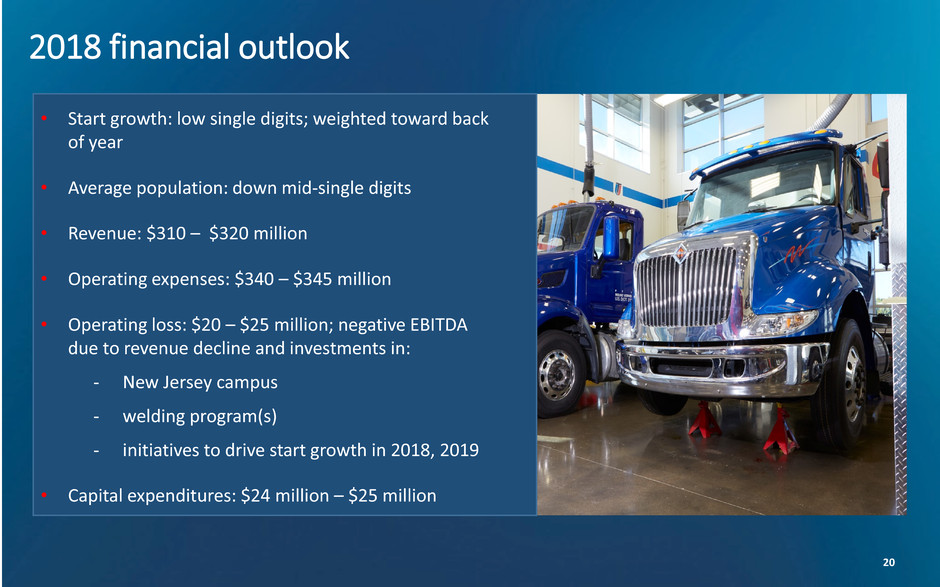
20
2018 financial outlook
• Start growth: low single digits; weighted toward back
of year
• Average population: down mid-single digits
• Revenue: $310 – $320 million
• Operating expenses: $340 – $345 million
• Operating loss: $20 – $25 million; negative EBITDA
due to revenue decline and investments in:
- New Jersey campus
- welding program(s)
- initiatives to drive start growth in 2018, 2019
• Capital expenditures: $24 million – $25 million
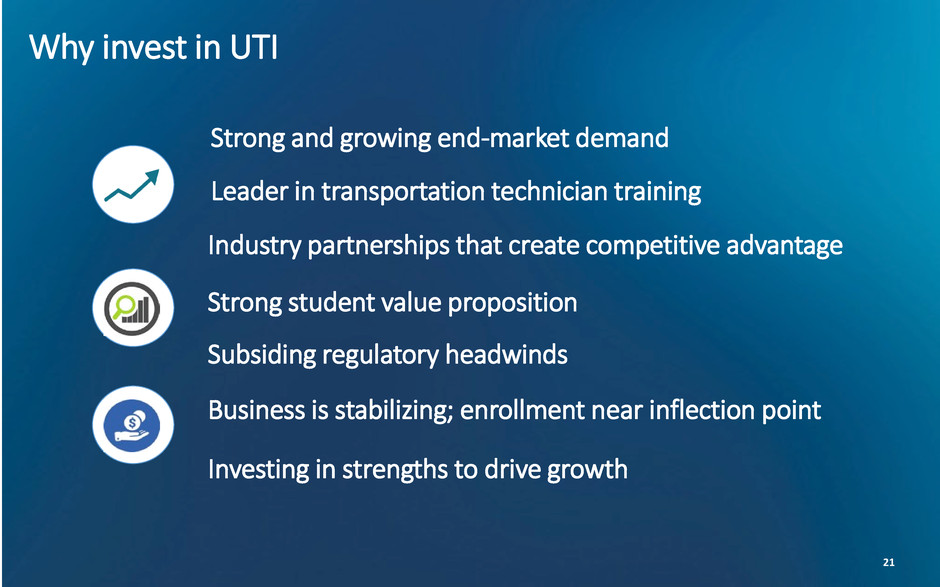
21
Strong and growing end-market demand
Strong student value proposition
Business is stabilizing; enrollment near inflection point
Why invest in UTI
Leader in transportation technician training
Industry partnerships that create competitive advantage
Investing in strengths to drive growth
Subsiding regulatory headwinds

Appendix
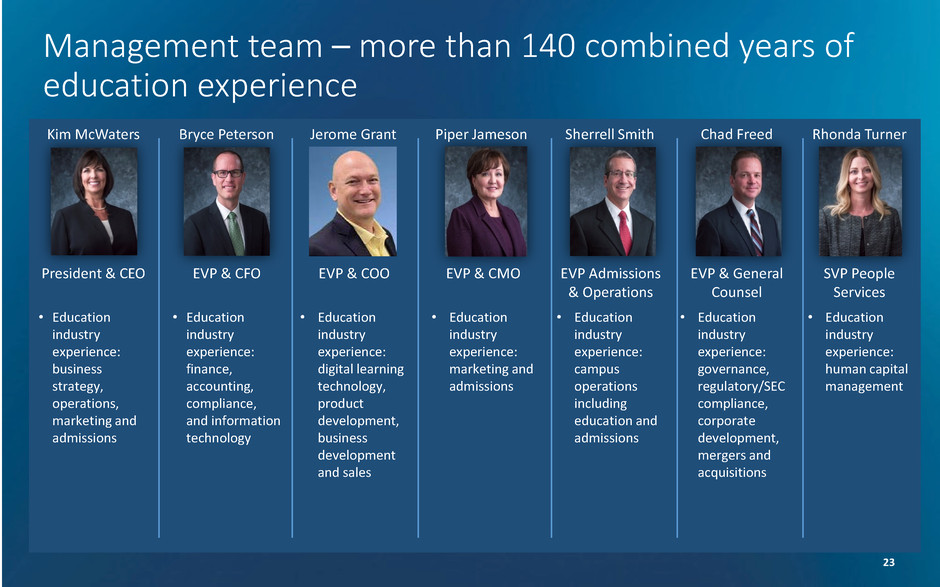
23
Management team – more than 140 combined years of
education experience
Kim McWaters
• Education
industry
experience:
business
strategy,
operations,
marketing and
admissions
President & CEO
Bryce Peterson
• Education
industry
experience:
finance,
accounting,
compliance,
and information
technology
EVP & CFO
• Education
industry
experience:
human capital
management
SVP People
Services
Rhonda Turner
EVP & General
Counsel
• Education
industry
experience:
governance,
regulatory/SEC
compliance,
corporate
development,
mergers and
acquisitions
Chad Freed
EVP Admissions
& Operations
• Education
industry
experience:
campus
operations
including
education and
admissions
Sherrell Smith
EVP & CMO
• Education
industry
experience:
marketing and
admissions
Piper Jameson
EVP & COO
• Education
industry
experience:
digital learning
technology,
product
development,
business
development
and sales
Jerome Grant
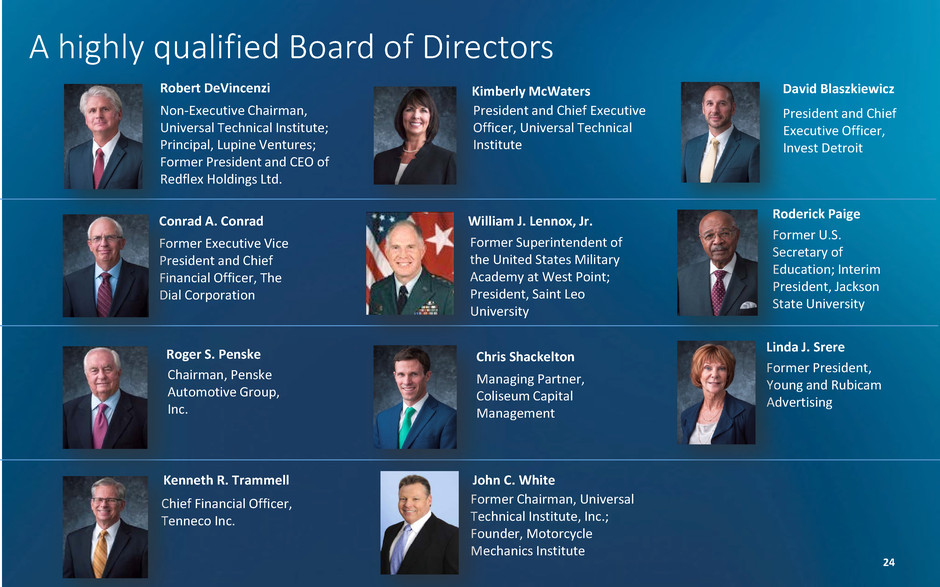
24
A highly qualified Board of Directors
Robert DeVincenzi
Non-Executive Chairman,
Universal Technical Institute;
Principal, Lupine Ventures;
Former President and CEO of
Redflex Holdings Ltd.
William J. Lennox, Jr.
Former Superintendent of
the United States Military
Academy at West Point;
President, Saint Leo
University
Conrad A. Conrad
Former Executive Vice
President and Chief
Financial Officer, The
Dial Corporation
Chris Shackelton
Managing Partner,
Coliseum Capital
Management
David Blaszkiewicz
President and Chief
Executive Officer,
Invest Detroit
Kenneth R. Trammell
Chief Financial Officer,
Tenneco Inc.
Former President,
Young and Rubicam
Advertising
Linda J. Srere Roger S. Penske
Chairman, Penske
Automotive Group,
Inc.
Kimberly McWaters
President and Chief Executive
Officer, Universal Technical
Institute
Roderick Paige
Former U.S.
Secretary of
Education; Interim
President, Jackson
State University
John C. White
Former Chairman, Universal
Technical Institute, Inc.;
Founder, Motorcycle
Mechanics Institute
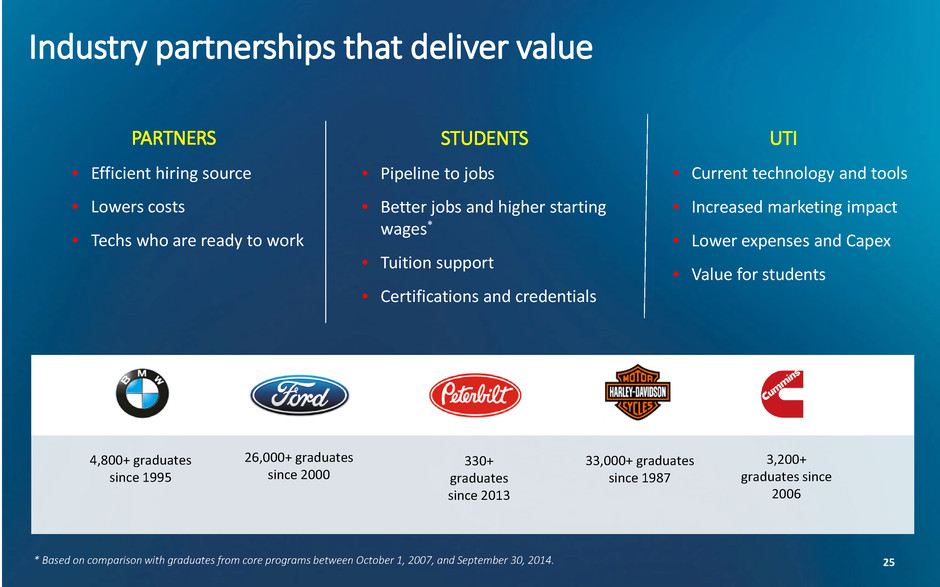
25
Industry partnerships that deliver value
* Based on comparison with graduates from core programs between October 1, 2007, and September 30, 2014.
PARTNERS
• Efficient hiring source
• Lowers costs
• Techs who are ready to work
UTI
• Current technology and tools
• Increased marketing impact
• Lower expenses and Capex
• Value for students
STUDENTS
• Pipeline to jobs
• Better jobs and higher starting
wages*
• Tuition support
• Certifications and credentials
4,800+ graduates
since 1995
33,000+ graduates
since 1987
330+
graduates
since 2013
26,000+ graduates
since 2000
3,200+
graduates since
2006
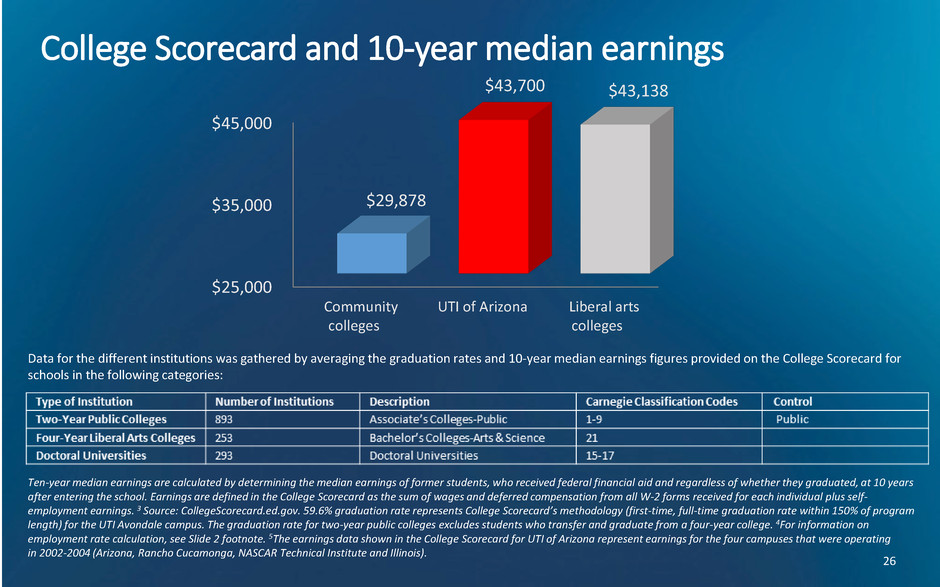
College Scorecard and 10-year median earnings
Data for the different institutions was gathered by averaging the graduation rates and 10-year median earnings figures provided on the College Scorecard for
schools in the following categories:
Ten-year median earnings are calculated by determining the median earnings of former students, who received federal financial aid and regardless of whether they graduated, at 10 years
after entering the school. Earnings are defined in the College Scorecard as the sum of wages and deferred compensation from all W-2 forms received for each individual plus self-
employment earnings. 3 Source: CollegeScorecard.ed.gov. 59.6% graduation rate represents College Scorecard’s methodology (first-time, full-time graduation rate within 150% of program
length) for the UTI Avondale campus. The graduation rate for two-year public colleges excludes students who transfer and graduate from a four-year college. 4For information on
employment rate calculation, see Slide 2 footnote. 5The earnings data shown in the College Scorecard for UTI of Arizona represent earnings for the four campuses that were operating
in 2002-2004 (Arizona, Rancho Cucamonga, NASCAR Technical Institute and Illinois).
$25,000
$35,000
$45,000
Community
colleges
UTI of Arizona Liberal arts
colleges
$29,878
$43,700 $43,138
26
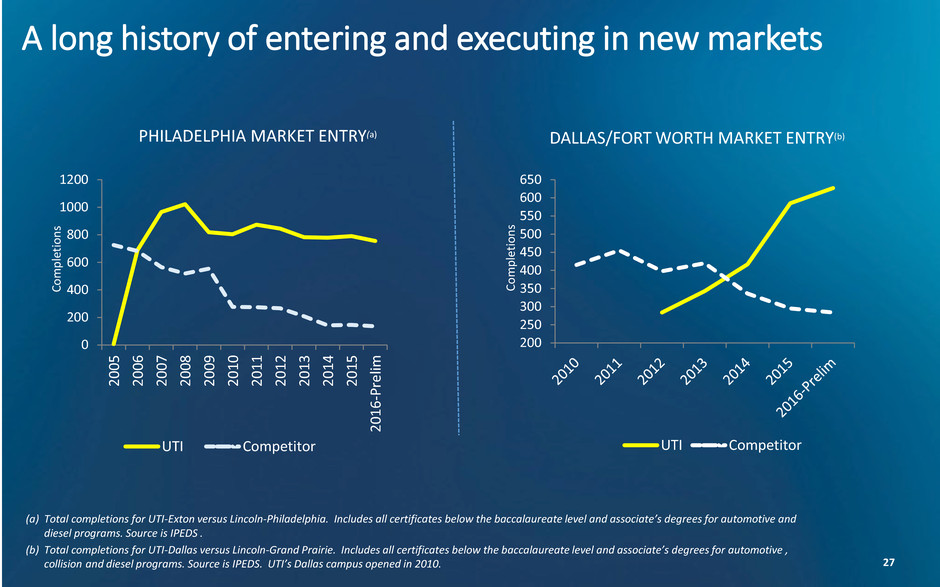
27
200
250
300
350
400
450
500
550
600
650
UTI Competitor
0
200
400
600
800
1000
1200
20
05
20
06
20
07
20
08
20
09
20
10
20
11
20
12
20
13
20
14
20
15
20
16
-P
re
lim
UTI Competitor
A long history of entering and executing in new markets
PHILADELPHIA MARKET ENTRY(a) DALLAS/FORT WORTH MARKET ENTRY(b)
(a) Total completions for UTI-Exton versus Lincoln-Philadelphia. Includes all certificates below the baccalaureate level and associate’s degrees for automotive and
diesel programs. Source is IPEDS .
(b) Total completions for UTI-Dallas versus Lincoln-Grand Prairie. Includes all certificates below the baccalaureate level and associate’s degrees for automotive ,
collision and diesel programs. Source is IPEDS. UTI’s Dallas campus opened in 2010.
Co
m
pl
et
io
ns
Co
m
pl
et
io
ns
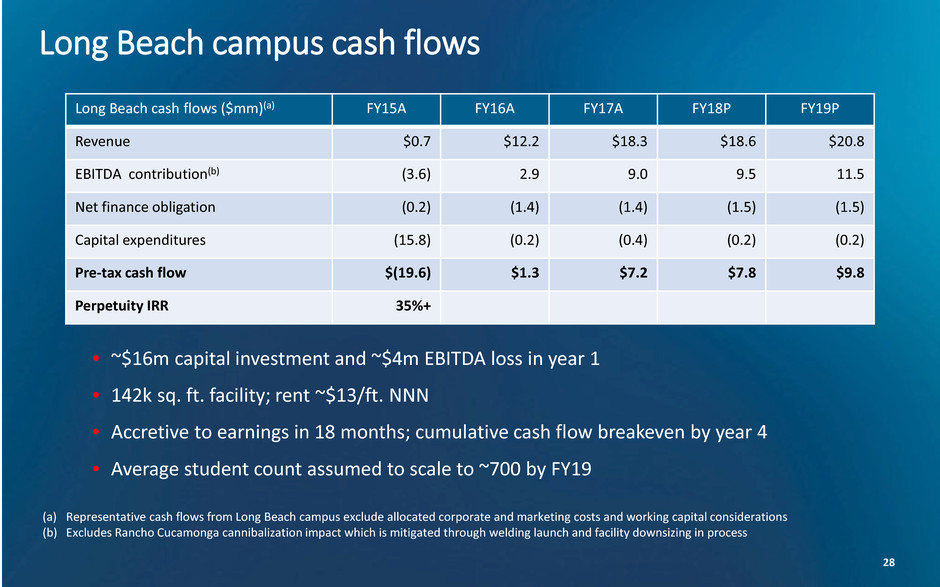
28
(a) Representative cash flows from Long Beach campus exclude allocated corporate and marketing costs and working capital considerations
(b) Excludes Rancho Cucamonga cannibalization impact which is mitigated through welding launch and facility downsizing in process
Long Beach campus cash flows
Long Beach cash flows ($mm)(a) FY15A FY16A FY17A FY18P FY19P
Revenue $0.7 $12.2 $18.3 $18.6 $20.8
EBITDA contribution(b) (3.6) 2.9 9.0 9.5 11.5
Net finance obligation (0.2) (1.4) (1.4) (1.5) (1.5)
Capital expenditures (15.8) (0.2) (0.4) (0.2) (0.2)
Pre-tax cash flow $(19.6) $1.3 $7.2 $7.8 $9.8
Perpetuity IRR 35%+
• ~$16m capital investment and ~$4m EBITDA loss in year 1
• 142k sq. ft. facility; rent ~$13/ft. NNN
• Accretive to earnings in 18 months; cumulative cash flow breakeven by year 4
• Average student count assumed to scale to ~700 by FY19
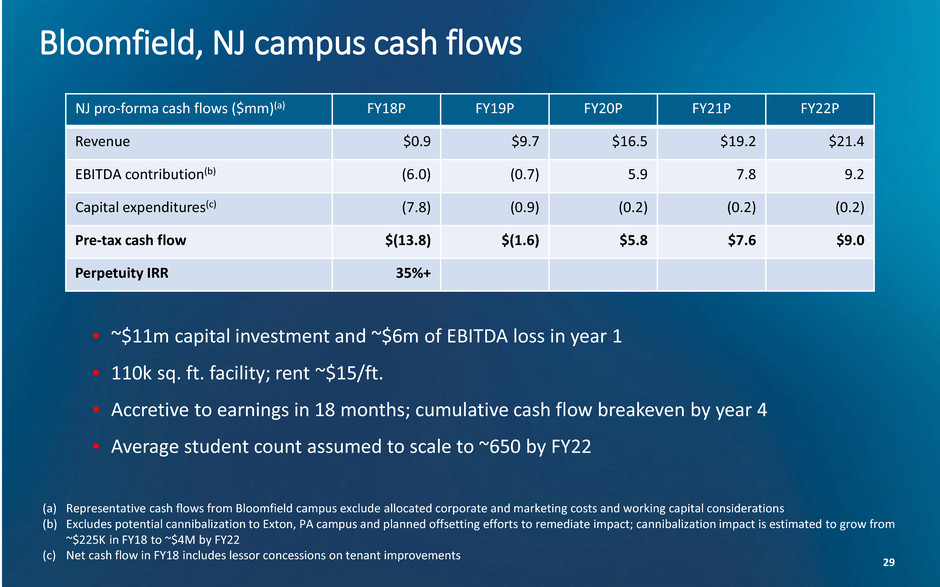
29
Bloomfield, NJ campus cash flows
• ~$11m capital investment and ~$6m of EBITDA loss in year 1
• 110k sq. ft. facility; rent ~$15/ft.
• Accretive to earnings in 18 months; cumulative cash flow breakeven by year 4
• Average student count assumed to scale to ~650 by FY22
NJ pro-forma cash flows ($mm)(a) FY18P FY19P FY20P FY21P FY22P
Revenue $0.9 $9.7 $16.5 $19.2 $21.4
EBITDA contribution(b) (6.0) (0.7) 5.9 7.8 9.2
Capital expenditures(c) (7.8) (0.9) (0.2) (0.2) (0.2)
Pre-tax cash flow $(13.8) $(1.6) $5.8 $7.6 $9.0
Perpetuity IRR 35%+
(a) Representative cash flows from Bloomfield campus exclude allocated corporate and marketing costs and working capital considerations
(b) Excludes potential cannibalization to Exton, PA campus and planned offsetting efforts to remediate impact; cannibalization impact is estimated to grow from
~$225K in FY18 to ~$4M by FY22
(c) Net cash flow in FY18 includes lessor concessions on tenant improvements
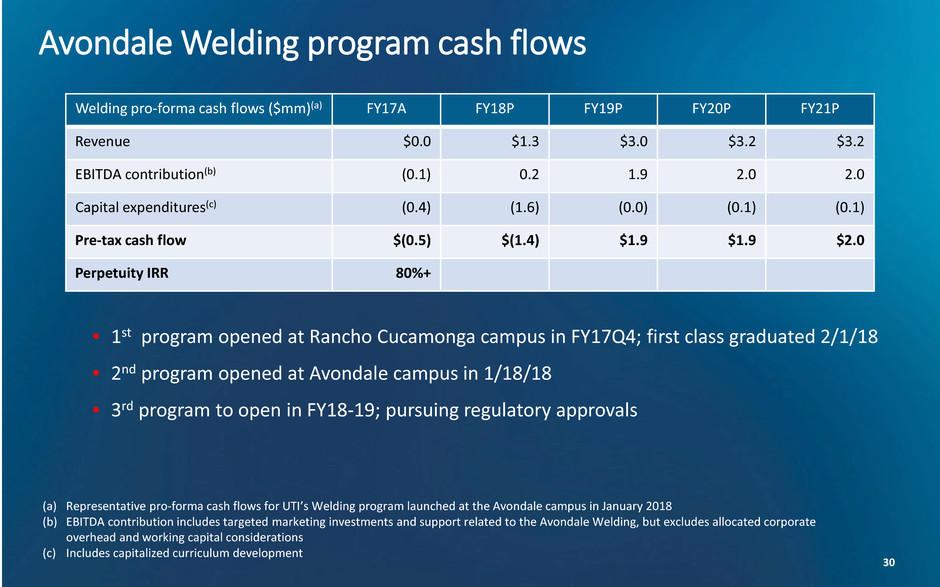
30
Avondale Welding program cash flows
(a) Representative pro-forma cash flows for UTI’s Welding program launched at the Avondale campus in January 2018
(b) EBITDA contribution includes targeted marketing investments and support related to the Avondale Welding, but excludes allocated corporate
overhead and working capital considerations
(c) Includes capitalized curriculum development
• 1st program opened at Rancho Cucamonga campus in FY17Q4; first class graduated 2/1/18
• 2nd program opened at Avondale campus in 1/18/18
• 3rd program to open in FY18-19; pursuing regulatory approvals
Welding pro-forma cash flows ($mm)(a) FY17A FY18P FY19P FY20P FY21P
Revenue $0.0 $1.3 $3.0 $3.2 $3.2
EBITDA contribution(b) (0.1) 0.2 1.9 2.0 2.0
Capital expenditures(c) (0.4) (1.6) (0.0) (0.1) (0.1)
Pre-tax cash flow $(0.5) $(1.4) $1.9 $1.9 $2.0
Perpetuity IRR 80%+
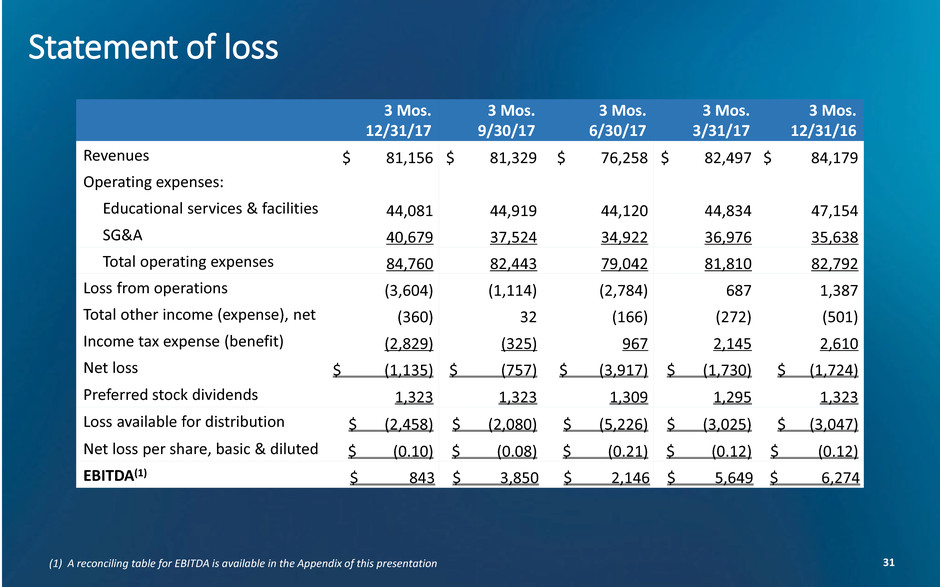
31
(1) A reconciling table for EBITDA is available in the Appendix of this presentation
Statement of loss
($ in thousands, except per share amounts) 3 Mos.
12/31/17
3 Mos.
9/30/17
3 Mos.
6/30/17
3 Mos.
3/31/17
3 Mos.
12/31/16
Revenues $ 81,156 $ 81,329 $ 76,258 $ 82,497 $ 84,179
Operating expenses:
Educational services & facilities 44,081 44,919 44,120 44,834 47,154
SG&A 40,679 37,524 34,922 36,976 35,638
Total operating expenses 84,760 82,443 79,042 81,810 82,792
Loss from operations (3,604) (1,114) (2,784) 687 1,387
Total other income (expense), net (360) 32 (166) (272) (501)
Income tax expense (benefit) (2,829) (325) 967 2,145 2,610
Net loss $ (1,135) $ (757) $ (3,917) $ (1,730) $ (1,724)
Preferred stock dividends 1,323 1,323 1,309 1,295 1,323
Loss available for distribution $ (2,458) $ (2,080) $ (5,226) $ (3,025) $ (3,047)
Net loss per share, basic & diluted $ (0.10) $ (0.08) $ (0.21) $ (0.12) $ (0.12)
EBITDA(1) $ 843 $ 3,850 $ 2,146 $ 5,649 $ 6,274
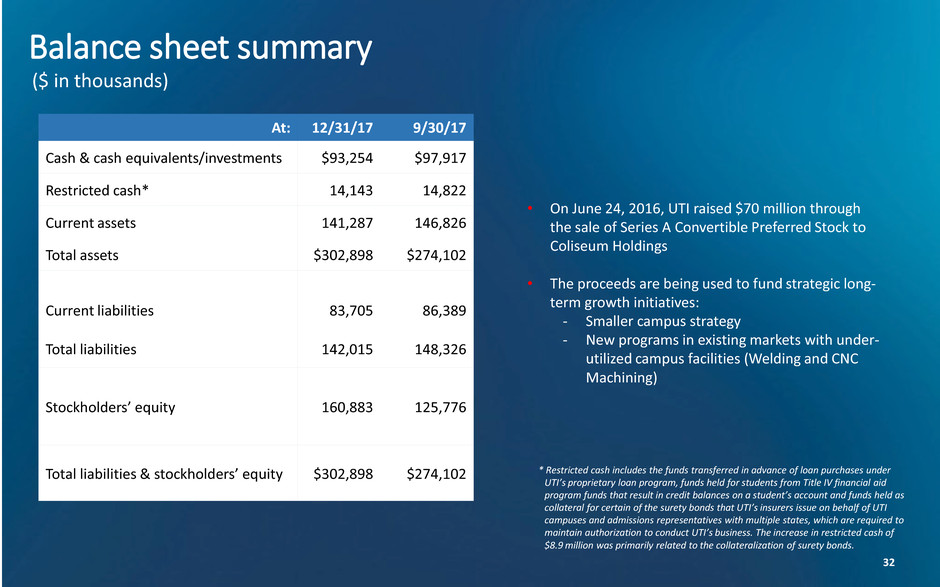
32
Balance sheet summary
($ in thousands)
• On June 24, 2016, UTI raised $70 million through
the sale of Series A Convertible Preferred Stock to
Coliseum Holdings
• The proceeds are being used to fund strategic long-
term growth initiatives:
- Smaller campus strategy
- New programs in existing markets with under-
utilized campus facilities (Welding and CNC
Machining)
* Restricted cash includes the funds transferred in advance of loan purchases under
UTI’s proprietary loan program, funds held for students from Title IV financial aid
program funds that result in credit balances on a student’s account and funds held as
collateral for certain of the surety bonds that UTI’s insurers issue on behalf of UTI
campuses and admissions representatives with multiple states, which are required to
maintain authorization to conduct UTI’s business. The increase in restricted cash of
$8.9 million was primarily related to the collateralization of surety bonds.
At: 12/31/17 9/30/17
Cash & cash equivalents/investments $93,254 $97,917
Restricted cash* 14,143 14,822
Current assets 141,287 146,826
Total assets $302,898 $274,102
Current liabilities 83,705 86,389
Total liabilities 142,015 148,326
Stockholders’ equity 160,883 125,776
Total liabilities & stockholders’ equity $302,898 $274,102
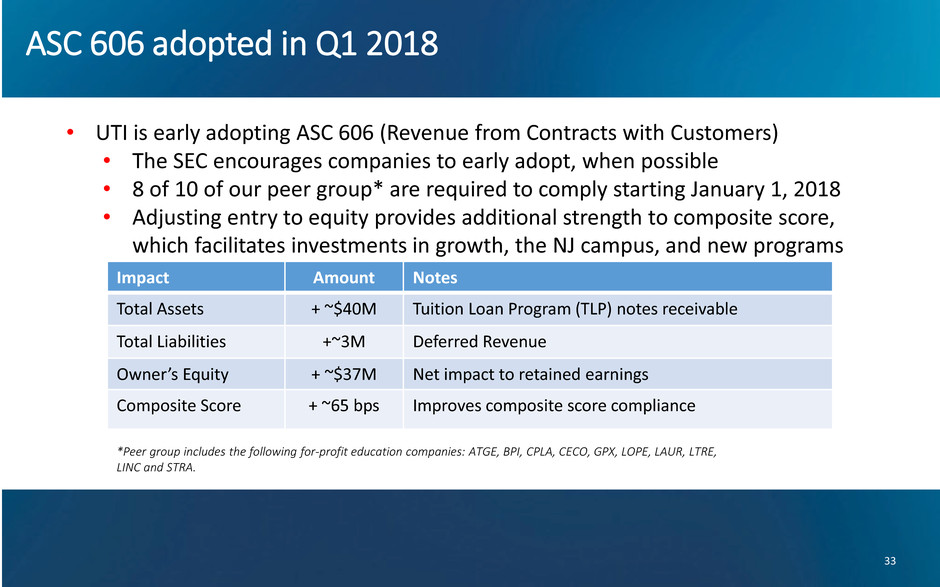
ASC 606 adopted in Q1 2018
33
• UTI is early adopting ASC 606 (Revenue from Contracts with Customers)
• The SEC encourages companies to early adopt, when possible
• 8 of 10 of our peer group* are required to comply starting January 1, 2018
• Adjusting entry to equity provides additional strength to composite score,
which facilitates investments in growth, the NJ campus, and new programs
Impact Amount Notes
Total Assets + ~$40M Tuition Loan Program (TLP) notes receivable
Total Liabilities +~3M Deferred Revenue
Owner’s Equity + ~$37M Net impact to retained earnings
Composite Score + ~65 bps Improves composite score compliance
*Peer group includes the following for-profit education companies: ATGE, BPI, CPLA, CECO, GPX, LOPE, LAUR, LTRE,
LINC and STRA.
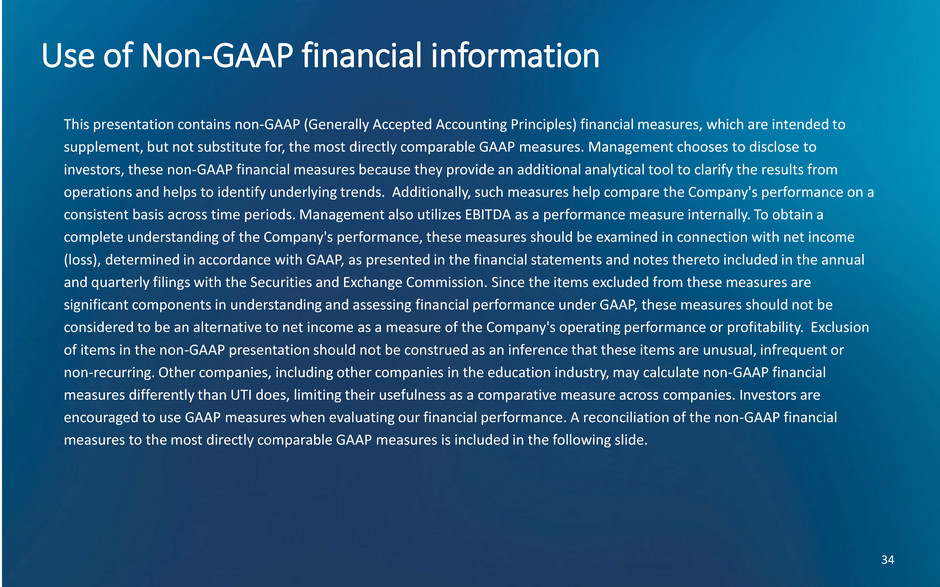
Use of Non-GAAP financial information
This presentation contains non-GAAP (Generally Accepted Accounting Principles) financial measures, which are intended to
supplement, but not substitute for, the most directly comparable GAAP measures. Management chooses to disclose to
investors, these non-GAAP financial measures because they provide an additional analytical tool to clarify the results from
operations and helps to identify underlying trends. Additionally, such measures help compare the Company's performance on a
consistent basis across time periods. Management also utilizes EBITDA as a performance measure internally. To obtain a
complete understanding of the Company's performance, these measures should be examined in connection with net income
(loss), determined in accordance with GAAP, as presented in the financial statements and notes thereto included in the annual
and quarterly filings with the Securities and Exchange Commission. Since the items excluded from these measures are
significant components in understanding and assessing financial performance under GAAP, these measures should not be
considered to be an alternative to net income as a measure of the Company's operating performance or profitability. Exclusion
of items in the non-GAAP presentation should not be construed as an inference that these items are unusual, infrequent or
non-recurring. Other companies, including other companies in the education industry, may calculate non-GAAP financial
measures differently than UTI does, limiting their usefulness as a comparative measure across companies. Investors are
encouraged to use GAAP measures when evaluating our financial performance. A reconciliation of the non-GAAP financial
measures to the most directly comparable GAAP measures is included in the following slide.
34
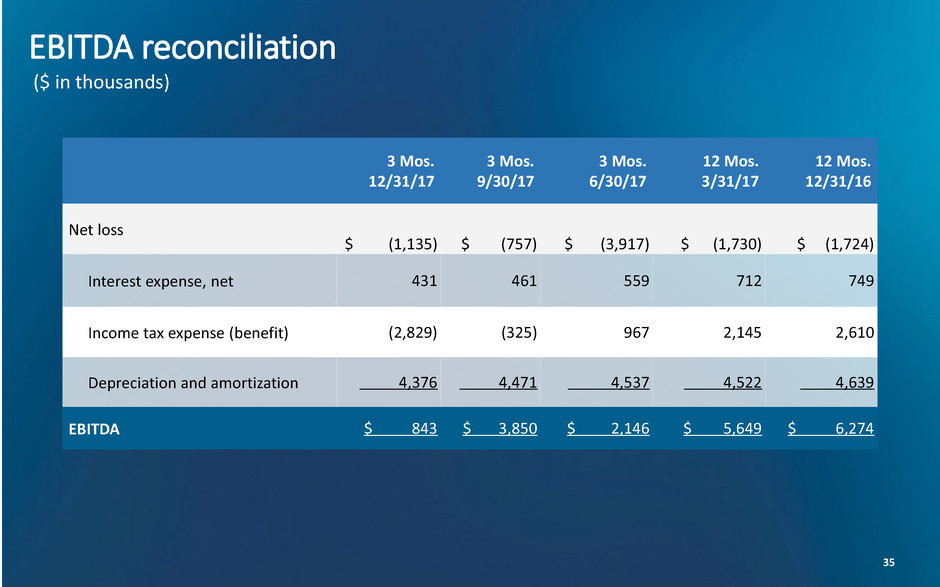
35
EBITDA reconciliation
($ in thousands)
3 Mos.
12/31/17
3 Mos.
9/30/17
3 Mos.
6/30/17
12 Mos.
3/31/17
12 Mos.
12/31/16
Net loss
$ (1,135) $ (757) $ (3,917) $ (1,730) $ (1,724)
Interest expense, net 431 461 559 712 749
Income tax expense (benefit) (2,829) (325) 967 2,145 2,610
Depreciation and amortization 4,376 4,471 4,537 4,522 4,639
EBITDA $ 843 $ 3,850 $ 2,146 $ 5,649 $ 6,274
